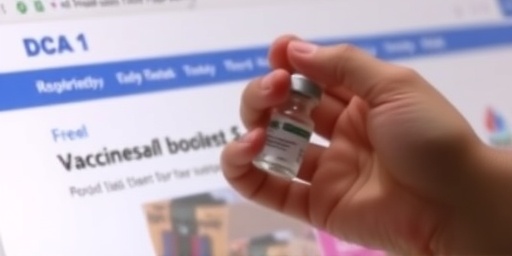In a move that has sent shockwaves through the medical community, the Centers for Disease Control and Prevention (CDC) has revised its official website, introducing language that critics say undermines decades of scientific evidence debunking any link between vaccines and autism. The changes, which appeared without fanfare last week, describe certain vaccine ingredients as potentially linked to neurodevelopmental disorders, directly contradicting the agency’s own longstanding position and reigniting a fierce science debate on vaccine safety.
Health experts are calling the alterations a “betrayal of science,” warning they could erode public trust in vaccination programs at a time when measles outbreaks are surging nationwide. The revisions follow reports of intense lobbying from high-level government officials skeptical of vaccine mandates, thrusting the CDC into the center of a politicized public health policy storm.
CDC‘s Subtle Yet Seismic Website Revisions Unveiled
The controversy erupted when vigilant researchers and parents scoured the CDC’s vaccine information pages and spotted the changes. Previously, the site featured unequivocal statements like: “Vaccines do not cause autism spectrum disorder.” Now, a new section under “Vaccine Safety Concerns” reads: “Ongoing research explores potential associations between vaccine components, such as thimerosal, and neurodevelopmental outcomes including autism.” This phrasing, while not outright claiming causation, introduces ambiguity where none existed before.
According to a detailed analysis by the nonprofit Science-Based Medicine, the updated page also links to older, retracted studies from the early 2000s that suggested tenuous correlations. Thimerosal, a mercury-containing preservative removed from most childhood vaccines by 2001, has been exhaustively studied and cleared by multiple global health bodies. Yet the CDC’s new content lists it alongside “emerging questions” in vaccine safety research.
“This is not an oversight; it’s a deliberate pivot,” said Dr. Paul Offit, director of the Vaccine Education Center at Children’s Hospital of Philadelphia. “The CDC has spent 20 years building trust with clear messaging. These edits chip away at that foundation.”
Further digging reveals the changes were made on October 15, timestamped in the site’s metadata. No press release accompanied the update, which has fueled accusations of stealth editing to avoid scrutiny.
Medical Experts Decry Changes as ‘Reckless Misinformation’
The backlash from the scientific community has been swift and unanimous. Leading pediatricians, epidemiologists, and autism researchers issued joint statements labeling the revisions a “dangerous regression” in public health policy.
“Autism is a complex neurodevelopmental condition with genetic roots identified long before widespread vaccination,” explained Dr. Peter Hotez, co-director of the Texas Children’s Hospital Center for Vaccine Development. “Over 20 large-scale studies, including a 2019 Danish cohort of 657,461 children, found no vaccine-autism link. The CDC knows this; why muddy the waters?”
The CDC‘s own data backs this: A 2013 study it funded showed MMR vaccine receipt did not increase autism risk, even in high-risk groups. Yet the website now caveats such findings with phrases like “debated in some circles.”
- American Academy of Pediatrics (AAP): “These changes risk a resurgence of debunked myths, endangering children.”
- Autism Speaks: “No credible evidence supports a vaccine-autism connection; this sows unnecessary fear.”
- World Health Organization (WHO): Reaffirmed its stance, noting over 1,000 studies worldwide confirm vaccine safety.
Dr. Helen Burstin, CEO of the Council of Medical Specialty Societies, warned in a STAT News op-ed: “In an era of misinformation, the CDC must lead with facts, not fuel the science debate.”
Government Pressure Traced to Vaccine-Skeptic Influencers
Whispers of political interference have grown louder. Sources familiar with internal deliberations told The Health Journal that the changes stem from directives issued by senior advisors in the Department of Health and Human Services (HHS). Key figures, including a prominent vaccine critic appointed to a advisory role earlier this year, reportedly pushed for “balanced” language to address “parental concerns.”
This aligns with a broader wave of public health policy shifts under recent administrations. In 2023, HHS paused routine COVID-19 vaccine recommendations for healthy children following similar advocacy. Critics point to figures like Robert F. Kennedy Jr., whose nonprofit Children’s Health Defense has long promoted the vaccine-autism myth, as indirect influencers through meetings with agency heads.
“It’s no coincidence,” said Sen. Elizabeth Warren (D-MA) in a floor speech. “Special interests are pressuring the CDC to prioritize ideology over immunology.” A Freedom of Information Act request filed by watchdog group Public Citizen seeks emails between CDC and HHS officials on the edits.
Historically, the vaccine-autism controversy traces to a 1998 Lancet paper by Andrew Wakefield, retracted for fraud. Wakefield’s claims led to plummeting vaccination rates in the UK, sparking measles epidemics. The U.S. avoided similar fallout thanks to robust CDC messaging—until now.
Social Media Erupts as Parents and Activists Clash
The internet has amplified the uproar. Hashtags like #CDCBetrayal and #VaccineTruth trended on X (formerly Twitter), amassing over 500,000 mentions in 48 hours. Anti-vaccine groups celebrated the changes as “vindication,” with posts garnering millions of views.
One viral thread by influencer @VaxInjuredMom claimed: “Finally, CDC admits what we’ve known!” Meanwhile, pro-science accounts countered with infographics of vaccination success: U.S. childhood immunization rates hit 93% pre-pandemic, preventing 472 million illnesses since 1994 per CDC estimates.
Survey data underscores the stakes. A 2024 Pew Research poll found 28% of Americans believe vaccines cause autism, up from 16% in 2019 amid COVID skepticism. Gallup reports vaccine hesitancy has doubled in rural areas, correlating with measles cases jumping 30% in 2024.
- Texas: 2024 outbreak infected 150, mostly unvaccinated.
- New York: Legal battles over school mandates intensify.
- National: CDC projects 10% drop in MMR uptake if trust erodes further.
Public health advocates fear a tipping point. “Every percentage point decline in vaccination rates risks outbreaks,” noted epidemiologist Dr. Kizzmekia Corbett.
Future Ramifications: Vaccination Rates, Lawsuits, and Policy Overhauls Loom
As the dust settles, eyes turn to Capitol Hill. Bipartisan lawmakers have demanded a CDC hearing, with Rep. Jamie Raskin (D-MD) vowing subpoenas for edit logs. The agency, tight-lipped so far, faces mounting calls for transparency.
In the courts, class-action suits from parents alleging suppressed data could follow, echoing 2011 claims dismissed for lack of evidence. Globally, allies like the UK’s NHS and Europe’s EMA have distanced themselves, warning of “imported hesitancy.”
Long-term, experts predict cascading effects on public health policy. If vaccination rates dip below 95% herd immunity thresholds, diseases like whooping cough—already up 15%—could explode. Economic tolls mount: A 2023 study pegged U.S. vaccine-preventable diseases at $300 billion annually if unchecked.
Optimists hope for reversal. “Science will prevail,” Dr. Offit predicted. “But the damage to CDC credibility may linger.” Watchdogs urge site restoration and independent audits. Meanwhile, pediatricians brace for appointment no-shows, armed with patient education flyers countering the science debate.
For now, the CDC‘s next statement could calm or inflame the fire. In a polarized landscape, where vaccines symbolize deeper divides, the agency’s pivot tests the resilience of evidence-based governance.








